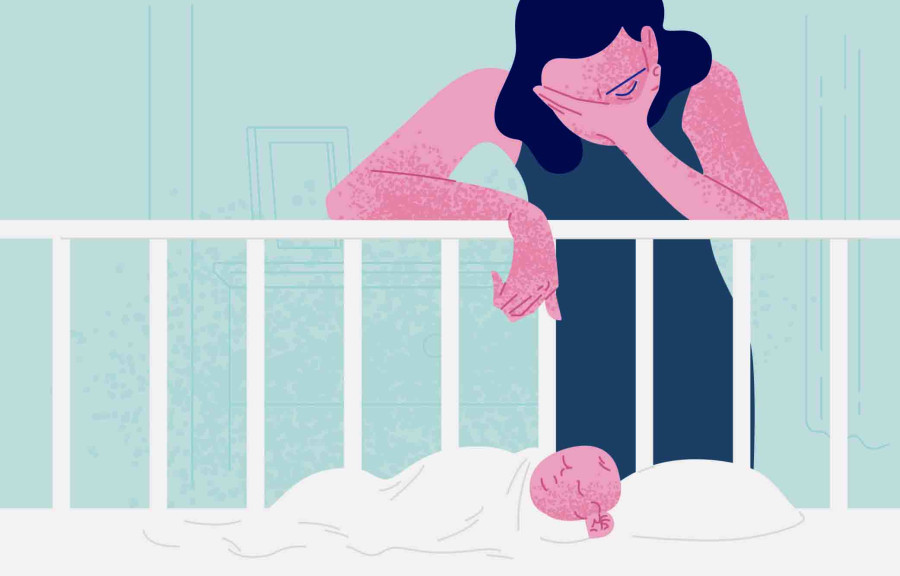Health
Mental health problems growing among new mums in Nepal
National Statistics Office data show six percent of maternal deaths were due to self-harm (suicide), with most cases occurring during pregnancy.
Arjun Poudel
A few weeks ago, a 26-year-old working class mother was rushed to the Thapathali-based Paropakar Maternity and Women’s Hospital, as she suffered from persistent sadness, sleeplessness, and loss of interest in everything including her newborn.
Doctors attending the patient identified that the woman was suffering from postpartum depression developed after the child birth.
“We prescribed anti-depressants to the patients, as she was suffering from anxiety and depression, which are serious mental health problems,” said Dr Pratikshya Ghimire, a psychiatrist at the hospital. “The patient is recuperating now, as her family members and in-laws were supportive.”
Every day, doctors at the maternity hospital refer to over half a dozen pregnant or postnatal women seeking care at the hospital for psychiatric and psychological counseling. Of those referred, the number of working class women is significant.
However, not all women suffering from prenatal depression (depression during pregnancy) and postpartum depression (depression after child birth) get proper treatment like the woman mentioned above, as most birthing centers throughout the country lack mental health screening services.
“Health workers including physicians may ask pregnant and postnatal women they suspect have mental health issues for seeking psychiatric or psychological help, but all may not be able to afford,” said Ghimire. “Thousands of women would benefit if mental health services were made available in maternity hospitals.”
Studies show that working mothers are at greater risk for postpartum depression.
Mental health problems during pregnancy are the second leading cause of maternal deaths, after excessive bleeding during childbirth, also known as postpartum haemorrhage, and pre-eclampsia (pregnancy-related high blood pressure disorders). A report on maternal mortality unveiled in 2022 by the National Statistics Office showed that six percent of maternal deaths were due to self-harm (suicide), with most cases occurring during pregnancy.
To address mental health problems during pregnancy, the Ministry of Health and Population started outpatient care services at the Maternity Hospital in October last year with the help of the World Health Organisation.
Health Officials had planned to expand such services to at least one hospital in each province.
“But due to the budget constraints, we could not expand the services this year,” said Dr Phadindra Baral, chief of the Mental Health Section at the Epidemiology and Disease Control Division. “We are aware that the service is essential and thousands of pregnant and postnatal women throughout the country will be benefitted if we provide it.”
Doctors say mental health problems in pregnant women and new mothers are more severe than previously believed, with around 20 percent women affected.
They say prenatal and postnatal depression can occur at any time during pregnancy or after childbirth. Shifts in hormone levels during pregnancy and after childbirth can significantly affect mood. Many women feel anxious about changes happening to their bodies. Some may even have financial concerns and some worry about taking on new and additional responsibilities.
Some women experience extreme sadness, anxiety, fatigue, and changes in sleeping and eating habits during pregnancy or after childbirth. Experts warn that prenatal and postnatal depression along with anxiety and other mental health issues, can lead some women to take their own lives.
In the case mentioned above, the woman worried excessively about her job, career, and future of the baby. She feared that she could not resume her job again, which not only increased her family’s financial troubles but also affected her career and the future of her newborn.
After treatment, her condition is getting better every day.
“We will adjust doses of her medicines in the coming days,” said Ghimire.
Health officials hope that screening pregnant women for mental health problems and providing prompt treatment will help reduce maternal deaths, which have been rising alarmingly of late.
Nepal reduced the maternal mortality rate from 539 per 100,000 births in 1996 to 239 per 100,000 births in 2016. For this, the country also received a Millennium Development Goals award.
The 2021 census report showed that in every 100,000 live births, 151 women died from maternity-related complications. A recent report by the UN health body shows that Nepal has reduced maternal deaths by over 70 percent since 2000. The UN health body, in its report stated that currently 142 Nepali women die from maternity-related complications per 100,0000 live births.
Nepal’s target under the UN’s Sustainable Development Goals is to reduce the maternal mortality rate to 75 per 100,000 births by 2030.




 24.04°C Kathmandu
24.04°C Kathmandu















